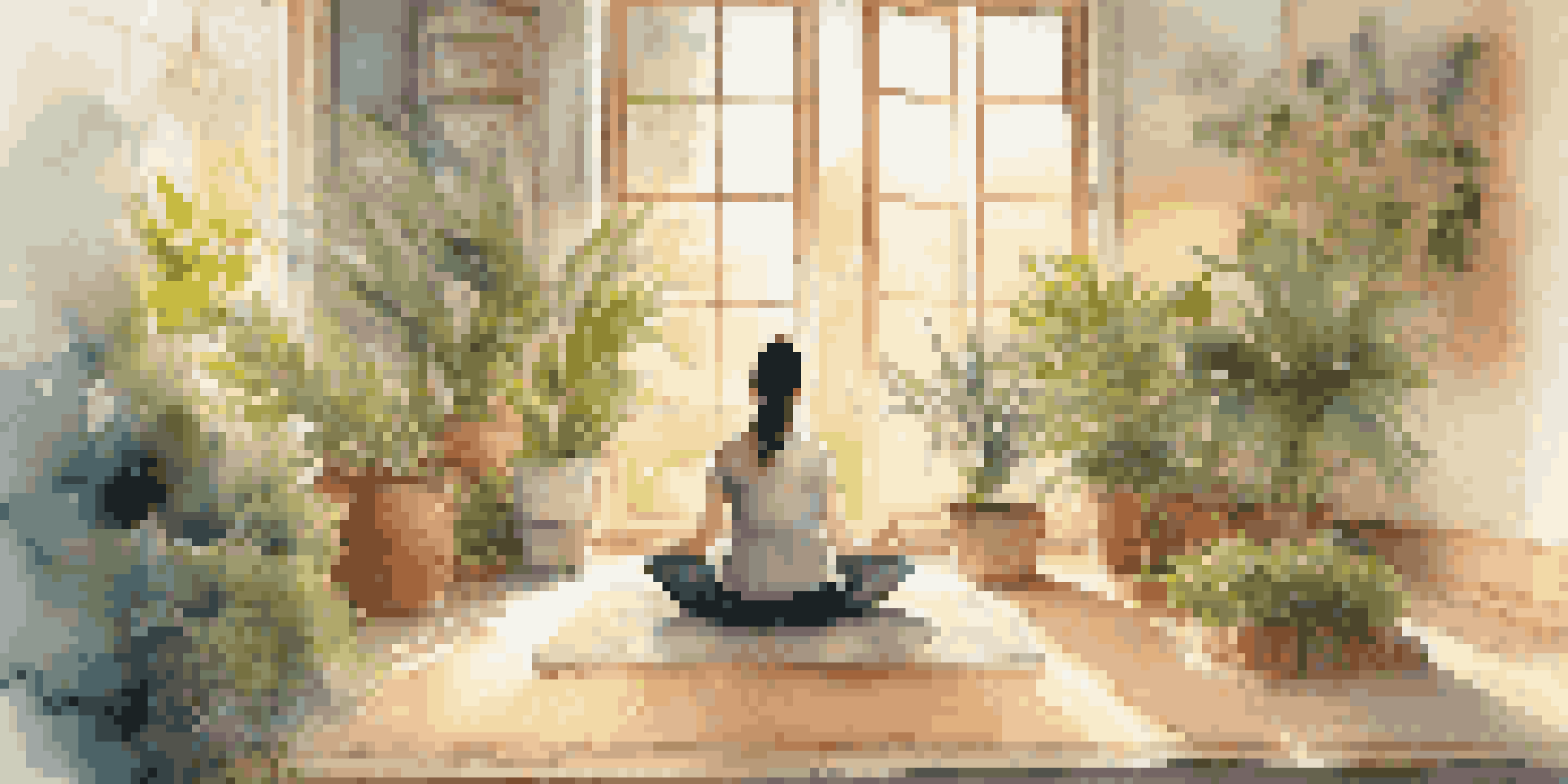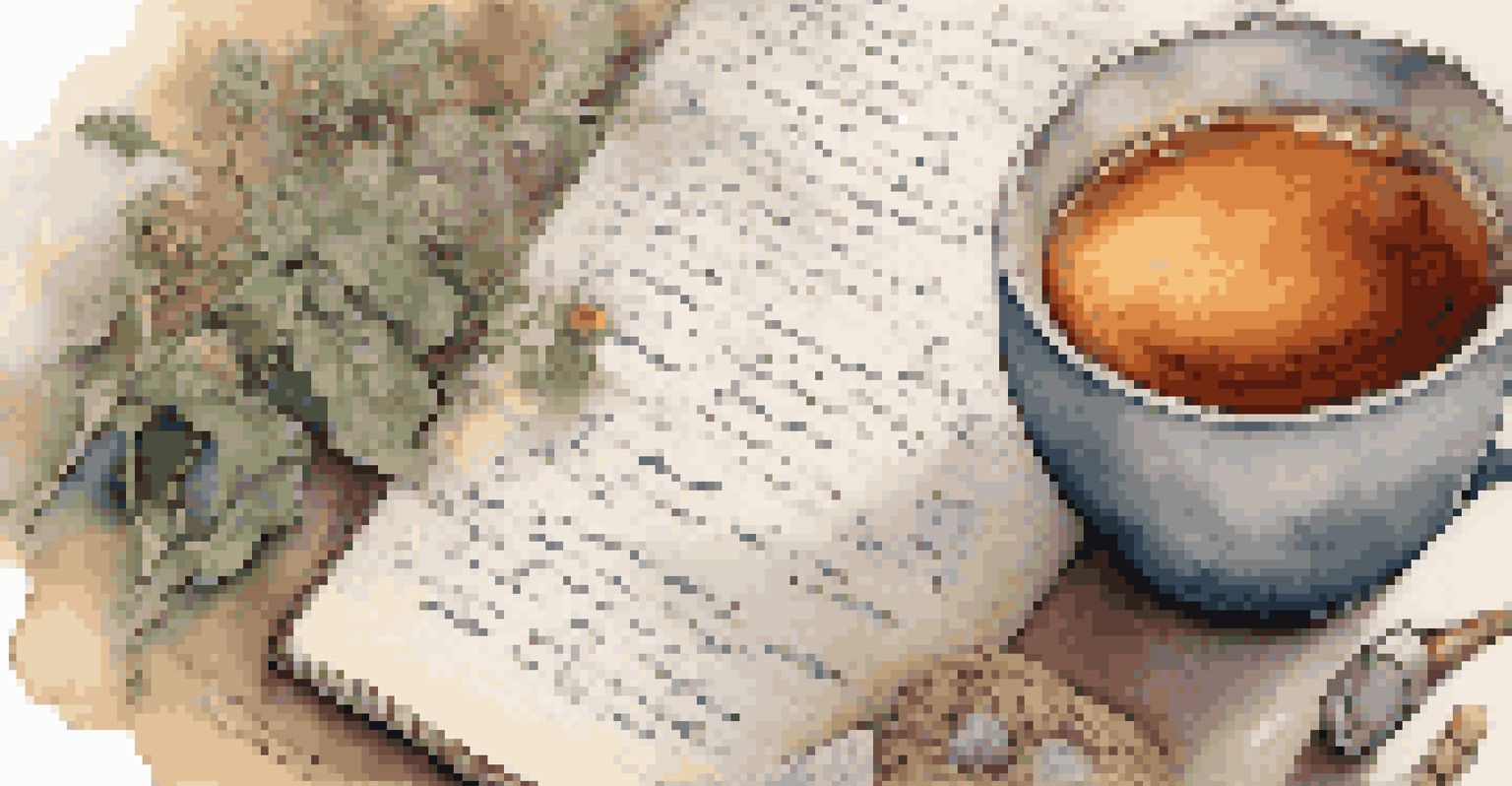The Role of Intuition in Holistic Health and Decision Making

Understanding Intuition in Holistic Health
Intuition is often described as a gut feeling or an instinct, a sense that guides us beyond logical reasoning. In holistic health, this inner voice plays a crucial role, as it encourages individuals to listen to their bodies and emotions. For instance, when feeling fatigued, intuition might suggest resting rather than pushing through the day. By tuning into these signals, we can make healthier choices that align with our overall well-being.
Your intuition knows what to write, so get out of the way.
Incorporating intuition into our health practices allows for a more personalized approach. Rather than following a one-size-fits-all regimen, we can adapt our routines based on what truly resonates with us. This might mean choosing yoga on some days and a brisk walk on others, all depending on how we feel in the moment. By embracing this flexibility, we cultivate a deeper connection with ourselves.
Moreover, intuition nurtures self-trust, an essential aspect of holistic health. When we learn to listen and respond to our inner guidance, we become more confident in our choices. This self-awareness enables us to recognize what works best for our bodies, leading to improved mental and physical health outcomes.
The Science Behind Intuition
While intuition often feels abstract, there's a growing body of research supporting its validity. Studies in psychology have shown that our brains process information on both conscious and subconscious levels, allowing us to make quick decisions based on past experiences. This phenomenon is what we often refer to as 'intuition.'

For example, a healthcare professional may have an intuitive sense about a patient's condition after years of experience, even before all tests confirm their suspicions. This blend of knowledge and instinct can lead to better patient outcomes, illustrating that intuition is not just guesswork, but rather an informed response. It highlights the importance of trusting our instincts, especially in health-related situations.
Intuition Enhances Health Choices
Listening to our intuition helps us make healthier decisions that align with our well-being.
Furthermore, the body's biological responses can also signal intuition. Physical sensations, like a racing heart or a knot in the stomach, can serve as indicators that something is off. By paying attention to these signals, we can gain insights into our emotional and physical states, enhancing our overall health management.
Intuition vs. Rational Decision Making
In decision-making, the balance between intuition and rationality is often debated. While rational thought relies on logic and data, intuition taps into our subconscious knowledge and emotional responses. Both approaches have their merits, but understanding when to lean on intuition can be crucial, especially in personal health decisions.
Trust yourself. You know more than you think you do.
For instance, choosing a treatment plan based on medical research is essential, but it’s equally important to consider how you feel about those options. If a particular medication doesn’t sit well with you emotionally, trusting that instinct can lead to better adherence and satisfaction. This shows that intuition can complement rational choices, creating a more holistic approach to decision-making.
Ultimately, recognizing when to prioritize each method can enhance our decision-making process. By allowing intuition to guide us alongside rational analysis, we can navigate complex health choices with greater ease and confidence.
Cultivating Intuition Through Mindfulness
Mindfulness practices, such as meditation and deep breathing, can significantly enhance our intuitive abilities. By quieting the mind and focusing on the present moment, we create space to hear our inner voice more clearly. This heightened awareness allows us to connect with our intuition and recognize its guidance in our daily lives.
For instance, setting aside just a few minutes each day for mindful reflection can help clarify our thoughts and feelings about health decisions. As we practice mindfulness, we may notice patterns or insights that we previously overlooked, leading to more informed choices. This process fosters a deeper relationship with our intuition, encouraging us to trust it more.
Mindfulness Boosts Intuitive Skills
Practicing mindfulness allows us to connect with our inner voice, improving our ability to trust our intuition.
Additionally, journaling about our thoughts and experiences can also strengthen our intuitive skills. Writing down our feelings about health can reveal underlying beliefs and emotions, helping us understand how they influence our decisions. This self-exploration nurtures intuition, making it a valuable tool in our holistic health journey.
The Role of Intuition in Preventative Health
Intuition plays a vital role in preventative health, guiding us toward practices that promote wellness before issues arise. Listening to our bodies can alert us to potential problems, encouraging us to seek help early. For example, if we notice persistent fatigue or unusual symptoms, our intuition may prompt us to consult a medical professional before matters escalate.
This proactive approach can lead to more effective health management and a better quality of life. When we trust our instincts, we become active participants in our health journeys. Instead of waiting for symptoms to dictate our actions, we can take charge and prioritize our well-being.
Moreover, intuitive choices in diet, exercise, and self-care can prevent health issues down the line. By being in tune with ourselves, we can make adjustments that support our long-term health goals. This preventative mindset fosters resilience, ultimately leading to a healthier and more balanced life.
Challenges in Trusting Intuition
Despite the benefits, many individuals struggle to trust their intuition, often second-guessing themselves. This can stem from societal pressures, misinformation, or past experiences that have led to doubt. For instance, when faced with conflicting information about health choices, it can be challenging to discern our intuition from external influences.
Additionally, fear of making the wrong decision can lead to hesitation. This fear can be particularly strong in health-related matters, where the stakes feel high. However, recognizing that intuition is a natural part of decision-making can help alleviate some of this pressure, allowing us to embrace it as a valuable asset.
Integrating Intuition with Care
Combining personal intuition with professional health guidance creates a more tailored and effective health plan.
To overcome these challenges, it’s essential to practice self-compassion and patience. By acknowledging that everyone struggles with trusting their intuition at times, we can create a more supportive environment for ourselves. With time and practice, we can learn to rely on our instincts and make decisions that align with our true selves.
Integrating Intuition with Professional Guidance
Integrating intuition with professional health guidance can lead to more comprehensive care. Health professionals often rely on both data and intuition, making informed decisions based on their knowledge and experience. By collaborating with a healthcare provider who values your intuitive insights, you can create a more tailored health plan.
For example, if you have a strong feeling about a specific treatment approach, sharing that with your provider can foster a more open dialogue. This exchange can lead to a better understanding of your preferences, ultimately enhancing the care you receive. It’s a partnership that respects both professional expertise and personal intuition.

Moreover, being open about your intuitive insights can empower you as a patient. When you actively participate in your health decisions, you cultivate a sense of ownership over your well-being. This collaborative approach not only strengthens the patient-provider relationship but also promotes a more holistic model of health care.